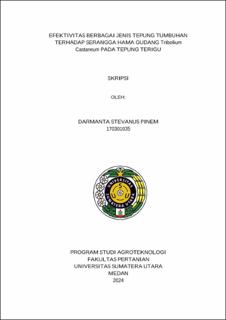| dc.contributor.advisor | Bakti, Darma | |
| dc.contributor.advisor | Marheni | |
| dc.contributor.author | Pinem, Darmanta Stevanus | |
| dc.date.accessioned | 2024-12-10T04:58:31Z | |
| dc.date.available | 2024-12-10T04:58:31Z | |
| dc.date.issued | 2024 | |
| dc.identifier.uri | https://repositori.usu.ac.id/handle/123456789/99297 | |
| dc.description.abstract | This research aims to determine the effectiveness of plant flour in controlling the pest Tribolium castaneum. The research was conducted at the Pest Laboratory, Faculty of Agriculture, University of Sumatra. This research was carried out from January 2024 to March 2024. The design used was a non-factorial Completely Randomized Design (RAL) consisting of treatment, namely the use of several types of botanical pesticides P1 (Control), P2 (Jicama), P3 (mengkudu) and P4 (jackfruit) The results of this study show that vegetable insecticide from jackfruit seeds using the contact method produces the highest percentage of mortality, namely 74%, the pest population is 7.5% and the percentage of weight loss only decreases by 7.5%. Vegetable insecticide from jackfruit seeds is effective to use because it is safe for humans and does not reduce the quality of wheat flour. . | en_US |
| dc.language.iso | id | en_US |
| dc.publisher | Universitas Sumatera Utara | en_US |
| dc.subject | Jicama | en_US |
| dc.subject | Holy | en_US |
| dc.subject | Jackfruit | en_US |
| dc.subject | Tribolium castaneum | en_US |
| dc.title | Efektivitas Berbagai Jenis Tepung Tumbuhan terhadap Serangga Hama Gudang Tribolium Castaneum pada Tepung Terigu | en_US |
| dc.title.alternative | Effectiveness of Various Types of Plant Flour Against Tribolium Castaneum Pests | en_US |
| dc.type | Thesis | en_US |
| dc.identifier.nim | NIM170301035 | |
| dc.identifier.nidn | NIDN0022015605 | |
| dc.identifier.nidn | NIDN0024076504 | |
| dc.identifier.kodeprodi | KODEPRODI54211#Agroteknologi | |
| dc.description.pages | 51 Pages | en_US |
| dc.description.type | Skripsi Sarjana | en_US |
| dc.subject.sdgs | SDGs 12. Responsible Consumption And Production | en_US |


